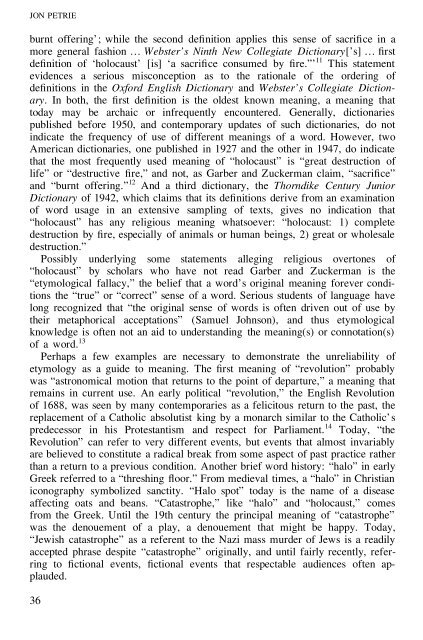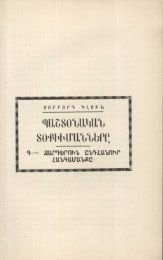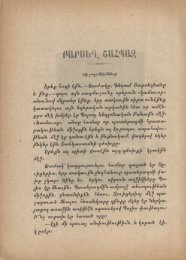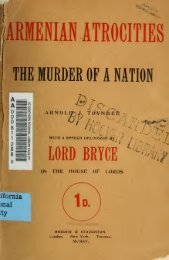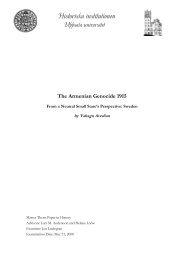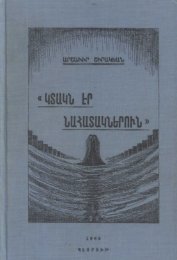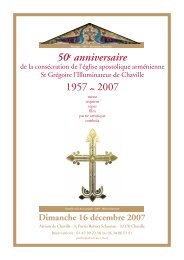The secular word HOLOCAUST: scholarly myths, history, and 20th ...
The secular word HOLOCAUST: scholarly myths, history, and 20th ...
The secular word HOLOCAUST: scholarly myths, history, and 20th ...
Create successful ePaper yourself
Turn your PDF publications into a flip-book with our unique Google optimized e-Paper software.
JON PETRIEburnt offering’; while the second de nition applies this sense of sacri ce in amore general fashion … Webster’s Ninth New Collegiate Dictionary[’s] … rstde nition of ‘holocaust’ [is] ‘a sacri ce consumed by re.”’ 11 This statementevidences a serious misconception as to the rationale of the ordering ofde nitions in the Oxford English Dictionary <strong>and</strong> Webster’s Collegiate Dictionary.In both, the rst de nition is the oldest known meaning, a meaning thattoday may be archaic or infrequently encountered. Generally, dictionariespublished before 1950, <strong>and</strong> contemporary updates of such dictionaries, do notindicate the frequency of use of different meanings of a <strong>word</strong>. However, twoAmerican dictionaries, one published in 1927 <strong>and</strong> the other in 1947, do indicatethat the most frequently used meaning of “holocaust” is “great destruction oflife” or “destructive re,” <strong>and</strong> not, as Garber <strong>and</strong> Zuckerman claim, “sacri ce”<strong>and</strong> “burnt offering.” 12 And a third dictionary, the Thorndike Century JuniorDictionary of 1942, which claims that its de nitions derive from an examinationof <strong>word</strong> usage in an extensive sampling of texts, gives no indication that“holocaust” has any religious meaning whatsoever: “holocaust: 1) completedestruction by re, especially of animals or human beings, 2) great or wholesaledestruction.”Possibly underlying some statements alleging religious overtones of“holocaust” by scholars who have not read Garber <strong>and</strong> Zuckerman is the“etymological fallacy,” the belief that a <strong>word</strong>’s original meaning forever conditionsthe “true” or “correct” sense of a <strong>word</strong>. Serious students of language havelong recognized that “the original sense of <strong>word</strong>s is often driven out of use bytheir metaphorical acceptations” (Samuel Johnson), <strong>and</strong> thus etymologicalknowledge is often not an aid to underst<strong>and</strong>ing the meaning(s) or connotation(s)of a <strong>word</strong>. 13Perhaps a few examples are necessary to demonstrate the unreliability ofetymology as a guide to meaning. <strong>The</strong> rst meaning of “revolution” probablywas “astronomical motion that returns to the point of departure,” a meaning thatremains in current use. An early political “revolution,” the English Revolutionof 1688, was seen by many contemporaries as a felicitous return to the past, thereplacement of a Catholic absolutist king by a monarch similar to the Catholic’spredecessor in his Protestantism <strong>and</strong> respect for Parliament. 14 Today, “theRevolution” can refer to very different events, but events that almost invariablyare believed to constitute a radical break from some aspect of past practice ratherthan a return to a previous condition. Another brief <strong>word</strong> <strong>history</strong>: “halo” in earlyGreek referred to a “threshing oor.” From medieval times, a “halo” in Christianiconography symbolized sanctity. “Halo spot” today is the name of a diseaseaffecting oats <strong>and</strong> beans. “Catastrophe,” like “halo” <strong>and</strong> “holocaust,” comesfrom the Greek. Until the 19th century the principal meaning of “catastrophe”was the denouement of a play, a denouement that might be happy. Today,“Jewish catastrophe” as a referent to the Nazi mass murder of Jews is a readilyaccepted phrase despite “catastrophe” originally, <strong>and</strong> until fairly recently, referringto ctional events, ctional events that respectable audiences often applauded.36


